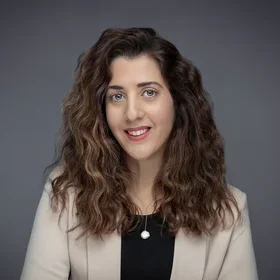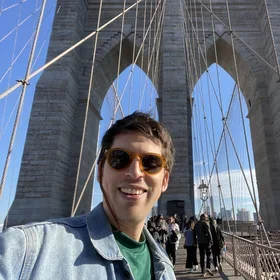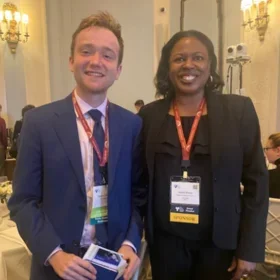“If you don't give 100 percent, you’re not going to get 100 percent back.” That’s how Joseph Olive (’25SPS, Wealth Management), soon-to-be graduate of Columbia University’s Master of Professional Studies in Wealth Management program, characterized his commitment to taking the next step in his professional career.
After serving in the U.S. military and obtaining his undergraduate degree in political science from the University of Maryland Global Campus in 2014, the last thing Joseph envisioned was a career in wealth management. But when he was approached by Charles Schwab almost a decade ago, he decided to take the leap and hasn’t looked back since.
Recently, Joseph transitioned from national financial services company Edward Jones to a smaller, upscale Registered Investment Advisor (RIA) firm called the Sather Financial Group. His objective after graduating from the Columbia School of Professional Studies (SPS) is to become a Certified Financial Planner. In a conversation with SPS, Joseph shared how the Wealth Management program fits in his unconventional career journey.
You recently transitioned to a new role at an RIA. Can you describe your new role and how this transition is connected to your time in the Wealth Management program?
Last August, I left the broker-dealer Edward Jones and transitioned to the Sather Financial Group. It has been a goal of mine to become a Certified Financial Planner, and part of that is going back to school, so I started doing research to see what university programs were out there.
One of the most appealing aspects of Columbia’s Wealth Management program was that the lecturers were world-renowned practitioners that had years of experience in the field. With the Columbia brand I knew this would be a challenging program, and that’s exactly what I was looking for. I wanted to get better at what I do: refine my process, increase my knowledge, and look out for my clients’ best interests.
What has been the most valuable aspect of your education at Columbia SPS?
Of course, the curriculum is fantastic. It’s not purely academic and it’s very relevant to the industry. My cohort is also amazing, I know that if I have a question, I have twenty-something other people who I can contact.
But to be honest, the most valuable aspect would be my ability to communicate with the lecturers, who are all seasoned professionals. There have been several times where I have reached out to them, as when I was considering moving to an RIA. I contacted my lecturer, and he set up a call for the next day. He is an incredibly busy senior partner at a large firm, but was immediately willing to talk with me for over an hour. You can’t find that kind of accessibility in other programs. To me, having access beyond the classroom to active practitioners who are very influential in the field is a key part of the program.
Could you share what your service in the military as an intelligence analyst was like?
I started thinking about joining the military when I was in college, after 9/11. Once the U.S. started to consider entering Iraq and Afghanistan, I made the decision to enlist in the Air Force.
I was in the geospatial intelligence unit for a few years, where we analyzed satellite and drone images from the U2 Dragon Lady spy plane and the Global Hawk, but when the Army asked for Weapons Intelligence Analysts for the Counter-Improvised Explosive Device (IED) team, I jumped at the chance.
After months of training with the FBI and other federal organizations, I eventually deployed to Iraq. Our team would go onto the scene of a detonated IED or suspected IED and do evidence collection, photography, and crime scene analysis to prevent further IEDs. For that, I earned an Army Combat Action Badge and the Air Force Combat Action Medal. After my tour, I cross-trained into the human intelligence field and even deployed again during that time.
I left after ten years, in 2014, created a LinkedIn profile, and was eventually contacted by Charles Schwab. Wealth management wasn’t what I had in mind when I began my job search, but with my college degree, veteran experience, and some knowledge of my own investments, the firm gave me the opportunity to join the financial sector as a stock broker.
In what ways have you engaged with the veteran community at Columbia?
I was initially attracted to Columbia because of its prestige: I wanted to participate in the most challenging program I could, with accomplished lecturers and a strong student base. As I started doing more research, I found out that Columbia is one of the top schools for veterans, especially among Ivy Leagues. Not only do they receive a lot of veterans, but they treat them very well, and this was something I experienced right off the bat. When I was accepted into the program, the process to accommodate my veteran tuition coverage programs was extremely streamlined. I had some experiences at another university where there didn’t really seem to be a process in place, and I had to do a lot of advocating and researching for myself.
I’m getting a world-class education, entirely covered by military programs, and it was so easy—they filed my paperwork, contacted Veteran Affairs (VA), and I didn’t have to do anything. I know a few other veterans in my cohort, and they’re incredibly happy with Columbia as well, so it’s really a great school to go to if you’re a veteran.
What advice would you give to someone considering applying to the Wealth Management program at Columbia?
I was on a panel a few months ago to share some advice to potential new students, and I gave them three main points. First, if you have a family, make sure to have a conversation with them and let them know that there may be some sacrifices. Also, definitely utilize the lecturers and ask them questions because they each have a wealth of knowledge that they would love to share with you. And finally, make sure to do your best—this is why you made a 16-month commitment.
It is challenging, and it can feel long and stressful, but the amount of knowledge that you will gain, the contacts, and the name brand make it well worth it. Yes, it’s a great program for you personally, but ultimately it is for the clients, because they’re the ones who will truly benefit.
About the Program
A 16-month online program with asynchronous instruction, specially designed to accommodate working professionals, Columbia University’s Master of Professional Studies in Wealth Management program is taught by distinguished faculty with deep applied experience in their respective fields. Additionally, it is a CFP Board Registered Program designed to help students meet the educational requirements for CFP® certification.


